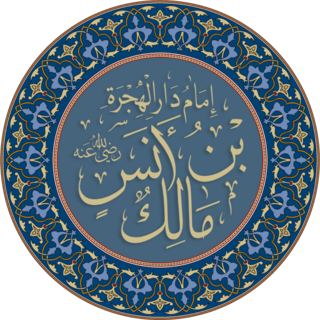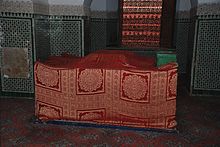
Muhammad ibn Isma'il ibn Ibrahim, better known as al-Bukhari, commonly referred to as Imam al-Bukhari or Imam Bukhari, was a Persian Islamic scholar who was born in Bukhara. He compiled the hadith collection known as Sahih al-Bukhari, regarded by Sunni Muslims as the most authentic (sahih) hadith collections. He also wrote other books such as Al-Adab al-Mufrad.

Malik ibn Anas, whose full name is Mālik bin Anas bin Mālik bin Abī ʿĀmir bin ʿAmr bin Al-Ḥārith bin Ghaymān bin Khuthayn bin ʿAmr bin Al-Ḥārith al-Aṣbaḥī al-Madanī, reverently known as al-Imām Mālik by Sunni Muslims, was an Arab Muslim jurist, theologian, and hadith traditionist. Born in the city of Medina, Malik rose to become the premier scholar of prophetic traditions in his day, which he sought to apply to "the whole legal life" in order to create a systematic method of Muslim jurisprudence which would only further expand with the passage of time. Referred to as the "Imam of Medina" by his contemporaries, Malik's views in matters of jurisprudence were highly cherished both in his own life and afterwards, and he became the founder of one of the four schools of Sunni law, the Maliki, which became the normative rite for the Sunni practice of much of North Africa, Al-Andalus, a vast portion of Egypt, and some parts of Syria, Yemen, Sudan, Iraq, and Khorasan, and the prominent Sufi orders, including the Shadiliyya and the Tijaniyyah.

Muhammad ibn Isa al-Sulami, commonly known by his nisbaal-Tirmidhi was an Islamic scholar and theologian. Among the prominent hadith collectors of the 9th-century, he compiled the Sahih al-Tirmidhi and the Shama'il al-Muhammadiyya.

Abū Muḥammad ʿAlī ibn Aḥmad ibn Saʿīd ibn Ḥazm was an Andalusian Muslim polymath, historian, jurist, philosopher, and theologian, born in the Caliphate of Córdoba, present-day Spain. Described as one of the strictest hadith interpreters, Ibn Hazm was a leading proponent and codifier of the Zahiri school of Islamic thought and produced a reported 400 works, of which only 40 still survive. In all, his written works amounted to some 80 000 pages. Described as one of the fathers of comparative religion, the Encyclopaedia of Islam refers to him as having been one of the leading thinkers of the Muslim world.
Abu Abd-Allah Muhammad ibn Abd-Allah al-Hakim al-Nishapuri, also known as Ibn al-Bayyiʿ, was a Persian Sunni scholar and the leading traditionist of his age, frequently referred to as the "Imam of the Muhaddithin" or the "Muhaddith of Khorasan."
Abu Bakr ibn al-Arabi or, in full Abū Bakr Muḥammad ibn ʿAbdallāh ibn al-ʿArabī al-Maʿāfirī al-Ishbīlī born in Sevilla in 1076 and died in Fez in 1148) was a Muslim judge and scholar of Maliki law from al-Andalus. Like Al-Mu'tamid ibn Abbad, Ibn al-Arabi was forced to migrate to Morocco during the reign of the Almoravids. It is reported that he was a student of Al-Ghazali. He was a master of Maliki Jurisprudence. His father was a student of Ibn Hazm. He also contributed to the spread of Ash'ari theology in Spain. A detailed biography about him was written by his contemporary Qadi Ayyad, the Malikite scholar and judge from Ceuta.
Abū Bakr Muḥammad ibn aṭ-Ṭayyib al-Bāqillānī, often known as al-Bāqillānī for short, or reverentially as Imām al-Bāqillānī by adherents to the Ash'ari 'aqidah, was a famous Sunni Islamic theologian, jurist, and logician who spent much of his life defending and strengthening the Ash'ari school of thought within Islam. An accomplished rhetorical stylist and orator, al-Baqillani was held in high regard by his contemporaries for his expertise in debating theological and jurisprudential issues. Al-Baqillani is often given the honorary epithets Shaikh as-Sunnah, Lisān al-Ummah, Imād ad-Dīn, Nāsir al-Islām, and Saif as-Sunnah by Ash'aris.

Al-Shifa bi Ta'rif Huquq al-Mustafa,, of Qadi Ayyad is perhaps the most frequently used and commented upon handbook in which Muhammad's life, his qualities and his miracles are described in every detail. Generally known by its short title, ash-Shifa or al-Shifa, this work was so highly admired throughout the Muslim world that it soon acquired a sanctity of its own, for it is said, "If al-Shifa is found in a house, this house will not suffer any harm... when a sick person reads it or it is recited to him, Allah will restore his health."
Sahnun ibn Sa'id ibn Habib at-Tanukhi was a jurist in the Maliki school from Qayrawan in modern-day Tunisia.
Abu al-Abbas Ahmad bin Abd al-Rahman bin Muhammad bin Sa'id bin Harith bin Asim al-Lakhmi al-Qurtubi, better known as Ibn Maḍāʾ was an Arab Muslim polymath from Córdoba in Islamic Spain. Ibn Mada was notable for having challenged the traditional formation of Arabic grammar and of the common understanding of linguistic governance among Arab grammarians, performing an overhaul first suggested by Al-Jahiz 200 years prior. He is considered the first linguist in history to address the subject of dependency in the grammatical sense in which it is understood today, and was instrumental during the Almohad reforms as chief judge of the Almohad Caliphate.
Abu al-Abbas Ahmad ibn Ja'far al-Khazraji al-Sabti, better known as Sidi Bel Abbas, was a Moroccan Muslim saint. He is the patron saint of Marrakesh in the Islamic tradition and also one of the "Seven Saints" of the city. His festival was founded by al-Hasan al-Yusi at the instigation of Moulay Ismael.
Awn al-Din Abu'l-Muzzafar Yahya ibn Hubayra al-Shaybani al-Duri al-Baghdadi, commonly referred to as Ibn Hubayra, was a 12th-century Iraqi Arab official and a Hanbali jurist, who served for sixteen years as vizier of the Abbasid Caliphate under Caliph al-Muqtafi, and his successor al-Mustanjid.
Muhibb al-Din Abu Abdallah Muhammad ibn Umar ibn Rushayd al-Fihri al-Sabti was a judge, writer and scholar of Hadith, born in Ceuta, North Africa. In 1284 he travelled east for three years to perform the hajj and study. During his travels he became friends with the future vizier of Granada Ibn al-Hakim al-Rundi. By Ibn al-Hakim's invitation, he came to Granada in 1292 or 1293 and was appointed as an imam and then a judge. After the vizier's assassination in 1309, he moved to the Marinid state where he became imam in Marrakesh, and then a close advisor to Sultan Abu Sa'id Uthman II. He died in February 1321 in Fez. He was well respected both during his life and in historical accounts, and left his writings on various topic, including on hadith, literature, and an account of his travel (rihla).
Abu Imran Musa ibn Isa ibn abi hajjal-Fasi was a Moroccan Maliki faqīh born at Fez to a Berber or Arab family whose nisba is impossible to reconstruct.
Abu al-Walid al-Baji was a famous Maliki scholar and poet from Beja, Al-Andalus.
Abu Bakr Muhammad ibn Ishaq ibn Khuzaymah was a Muslim Muhaddith and Shafi'i jurist, best known for his hadith collection, Sahih Ibn Khuzaymah.
Al-Ḫaṣṣāf was a Hanafite law scholar at the court of the 14th Abbasid Caliph al-Muhtadi.

The Ẓāhirīmadhhab or al-Ẓāhirīyyah is a Sunnī school of Islamic jurisprudence founded by Dāwūd al-Ẓāhirī in the 9th century CE. It is characterized by reliance on the outward (ẓāhir) meaning of expressions in the Quran and ḥadīth literature; the consensus (ijmāʿ) of the first generation of Muhammad's closest companions (ṣaḥāba), for sources of Islamic law (sharīʿa); and rejection of analogical deduction (qiyās) and societal custom or knowledge (urf), used by other schools of Islamic jurisprudence.

The literature of al-Andalus, also known as Andalusi literature, was produced in Al-Andalus, or Islamic Iberia, from the Muslim conquest in 711 to either the Catholic conquest of Granada in 1492 or the Expulsion of the Moors ending in 1614. Andalusi literature was written primarily in Arabic, but also in Hebrew, Judeo-Arabic, Aljamiado, and Mozarabic.
Abu ʾl-Walīd Muḥammad ibn Aḥmad ibn Aḥmad ibn Rushd, nicknamed al-Jadd, was a Muslim jurist of the Mālikī school. He was the most prominent Mālikī jurist of his time in al-Andalus (Spain) and the Maghrib, but his fame today rests on being the grandfather of the philosopher Ibn Rushd (Averroes).










